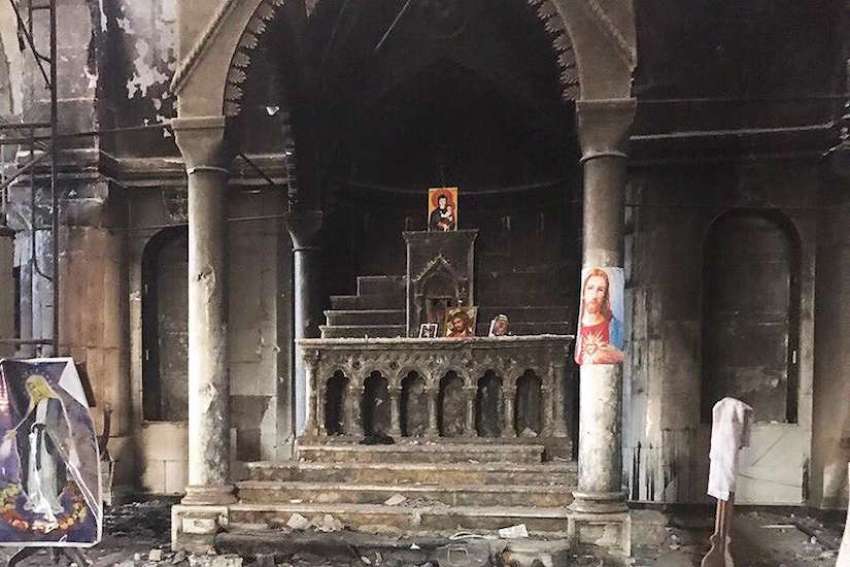“(When) we went to see what happened to our hometowns, we could not believe the hatred and the revenge that ISIS has against us,” said Sister Diana Momeka, a nun with the Dominican Sisters of Saint Catherine of Siena who ministers to those displaced by ISIS.
Sister Diana had taught at St. Ephrem Seminary in Bakhdida, Iraq before ISIS invaded in the summer of 2014 and drove out the region’s Christians. The destruction, she told CNA, was “beyond imagination.”
After ISIS took over much of Northern Iraq in 2014, tens of thousands of refugees fled eastward into Iraqi Kurdistan. Many have been living in temporary housing unfit for the winter season, relying upon aid groups for their basic needs.
Some of the Christians came from the Nineveh Plain, which lies between the city of Mosul – Iraq’s second-largest city and the current site of conflict between ISIS occupiers and coalition forces fighting to retake it – to the west and Iraqi Kurdistan to the east.
Recently, towns on the Nineveh Plain were liberated from ISIS control by a military coalition that included local militia. Christians who had been living in temporary shelters headed back home with joyful hearts, Sister Diana said.
But what they saw when they arrived home broke their hearts. Evidence of ISIS’ hatred and revenge was everywhere in the destruction of their homes. Graffiti on the walls of churches made threats like “we’re going to break your crosses” and “you have no place with us.”
“It’s a total mess,” Sister Diana said. “There was some hope to have a future,” she noted, but “we feel that there’s no future left for the Christians. It’s kind of a sign for us, ‘you should leave, we’ve destroyed everything you have.’”
Christians found that even their neighbors had betrayed them. “We discovered so many of our documents and our belongings at their places,” Sister Diana said.
“It is a genocide against us because they left us with nothing at all,” she said of ISIS.
Many residents still face the struggle of rebuilding their homes and villages, reconciling with their neighbors, and establishing security. It is a race against time to rebuild their homes before everyone chooses to leave Iraq, said Fr. Benham Benoka, president of the Humanitarian Nineveh Relief Organization which Sister Diana works with.
“So many families are leaving Iraq,” he told CNA. And the situation is even worse for those families who have left and are currently stranded in Lebanon, Turkey, and Jordan.
Christians in the region need housing, employment, education, and treatment for medical and mental health issues, and Fr. Benham’s organization is doing its best to provide for their needs. The relief organization has provided over 200,000 patients with free health care, as well as other types of aid.
“The faith of the people is strong, even if they are leaving the country or they are staying there,” he said.
“But they’re still praying, they still have hope in a big miracle for their lives,” he added of the patients.
Pope Francis, who in 2014 called Fr. Benoka and told him “I am with you in prayer always. I never forget you,” sent a container of medical supplies to the group in November, Fr. Benoka said.
“We thank him from our hearts,” he said.
Others displaced from their homes by violence may not be able to return home yet, or various reasons. They may fear for their security, particularly after their neighbors betrayed them to ISIS.
The Syrian Catholic prelate of Mosul recently told the group Aid to the Church in Need that Muslim neighbors burned down 75 percent of Christian homes in the villages that have been freed from ISIS control.
“We are afraid that we will have to continue to live with these people. We impatiently awaited liberation, and many wanted to return immediately, but there first need to be guarantees for our safety,” he said.
Fr. Benoka estimated that “if the situation continues as it is now,” in two years the region could be empty of Christians. “The cradle of Christianity will be empty,” he said.
His relief organization has “grown day after day,” he said, “because of the continual needs of the people who need health care.” They have received support from friends and other Christian non-governmental organizations.
“It’s not easy” to meet all the needs of the displaced families, he said. “It’s very, very difficult, and we need, really, the support of everybody.”
(Story from the Catholic News Agency)


